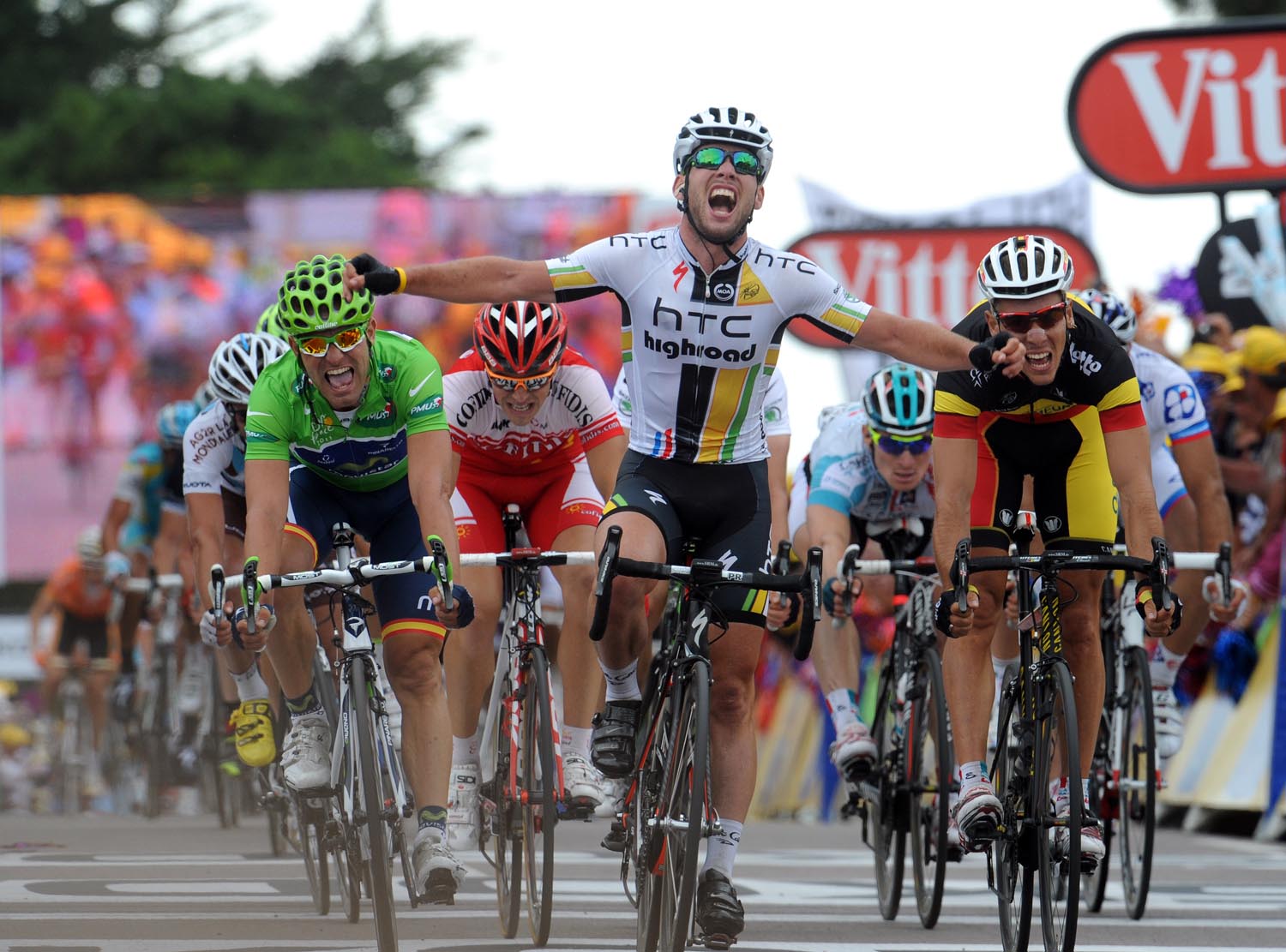Cavendish's race for Tour de France green jersey

Mark Cavendish's race for the Tour de France's green jersey has taken a new twist this year due to a rule change. Though he sits fourth overall with 84 points after Wednesday's stage five win, he's not sure how the new rule will change his push for sprinters' prized top.
"I don't know," he told Cycling Weekly yesterday morning. "Like always, I really can't say until after the Tour."
The Tour de France changed the points scale for the stages this year: flat and medium-mountain stages offer more points, but not as deep; and the intermediate sprint, now only one a day, offers greater and deeper points.
The intermediate sprint offers 20 points for the win and the following points for second through 15th: 17, 15, 13, 11, 10, 9, 8, 7, 6, 5, 4, 3, 2 and 1; a flat stage offers 45, 35, 30, 26, 22, 20, 18, 16, 14, 12, 10, 8, 6, 4 and 2.
Cavendish gained 45 points yesterday for the win in Cap Fréhel and 5 points for 11th in the intermediate sprint. He would have had more, but he sat up after rivals Tom Boonen (Quick Step) and José Joaquín Rojas (Movistar) blocked him. The jury disqualified the two from the intermediate sprint, as it did Cavendish and Thor Hushovd (Garmin-Cervélo) two days prior in Redon.
The cyclists are pushing themselves harder for the intermediate sprint and the jury is monitoring closely.
"It's different, it's much more exciting for the fans; for the riders, it's more stress," HTC-Highroad's coach, Erik Zabel told Cycling Weekly.
The latest race content, interviews, features, reviews and expert buying guides, direct to your inbox!
Zabel won six green jerseys when the race used the old points scale. Up until last year, there were several intermediate sprints per day that offered points for the top three only (3, 2 and 1) and the win carried 35 points, but riders as far back as 25th place got a point.
"In the old days, you'd let an escape of five riders go and have an easy day at the back of the bunch because there were no points to gain. Now, they are more or less sprinting full gas for sixth place," Zabel continued.
"No sprinter likes it, it gives you extra pressure and you have to stay focused."
"Mark doesn't like to race for the intermediates, there's extra stress. If he wins two, three, four or five stages, he's a hero, if he wins five intermediate sprints, no one cares."
Along with Germany's Zabel, Italian Mario Cipollini was one of the greatest sprinters of 1990s and 2000s. The two often clashed at the Tour de France, but Cipollini never won a green jersey.
The rule change "is better for those who are going strongly. The riders need to adjust to the rules, that's that," Cipollini told Cycling Weekly.
Cavendish "has to be stronger than them all and win stages. He is the strongest sprinter around in my opinion."
He currently trails Philippe Gilbert by 36 points, but may move ahead in the points in the next stages. Another win may come as soon as today (Thursday) in Lisieux or in Châteauroux on Friday. Cavendish won his first Tour de France stage in Châteauroux in 2008.
"With the new system," added Zabel, "he can earn 65 points in just one day, with the finish and intermediate."
Tour de France 2011 points classification after stage five
1. Philippe Gilbert (Omega Pharma-Lotto) 120
2. Jose Joaquin Rojas (Movistar) 112
3. Cadel Evans (BMC Racing) 90
4. Mark Cavendish (HTC-Highroad) 84
5. Thor Hushovd (Garmin-Cervélo) 82
6. Tyler Farrar (Garmin-Cervélo) 68
Tour de France 2011: Related links
Tour de France 2011: Cycling Weekly's coverage index

Founded in 1891, Cycling Weekly and its team of expert journalists brings cyclists in-depth reviews, extensive coverage of both professional and domestic racing, as well as fitness advice and 'brew a cuppa and put your feet up' features. Cycling Weekly serves its audience across a range of platforms, from good old-fashioned print to online journalism, and video.